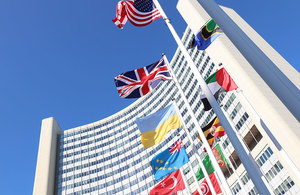OSCE Economic and Environmental Forum Session 3: UK statement
Mr chair,
The pandemic and countries’ responses to the crisis led to border restrictions, lower or stalled manufacturing outputs, spikes in demand for some goods, like personal protective equipment (PPE), and drops in demand for others. This combination of impacts led to significant challenges for the global supply chains, such as delays, diversions, and capacity constraints, all increasing costs.
The UK’s starting position when building resilience in critical supply chains is to choose the minimum intervention and take a market-first approach. To strengthen the resilience of the UK’s critical global supply chains we trained up to 5,000 more HGV drivers in England and moved 29,000 additional lorry loads of freight to railways.
The transport industry was one of the hardest hit by the pandemic. International aviation passenger traffic was down 60% over 2020, bringing air travel totals back to 2003 levels. Transport facilitation can support economic recovery as this industry gets back on its feet. And states can intervene to mitigate the environmental effect. For example, airline slots that airlines are compelled to honour result in environmentally-damaging and expensive ‘ghost’ flights continuing to operate with few passengers. The UK government has just extended alleviation from these slot rules and widened the list of situations where airlines can claim justification for not using their slots. This balances the need for continued support for the aviation sector’s finances, providing airlines with flexibility, while ensuring slots get used where demand allows.
And from the sky, to the road. We have committed to ending the sale of new petrol and diesel cars by 2030, and ensuring that by 2035 all cars must be fully zero emissions capable. Industry figures show over 650,000 new plug-in cars registered in the UK since 2010, and over 1 in 7 cars sold in 2021 had a plug. And range is increasing as costs are falling: There are 20 electric vehicle models that now come with a range of over 200 miles, and battery prices are little more than a tenth of what they were in 2010.
The UK government is ensuring that our charging infrastructure network is reliable, accessible, and meets the demands of all motorists, with over 25,000 public charging points in the UK, and a particular focus on local on-street residential charging.
The car and van sector is relatively easier to decarbonise, through the combination of a proven low carbon technology and growing consumer demand; and the trend in this industry is positive. But governments still have a key role to play in making sure this heavily polluting sector is free to realise its green potential.
Thank you.

